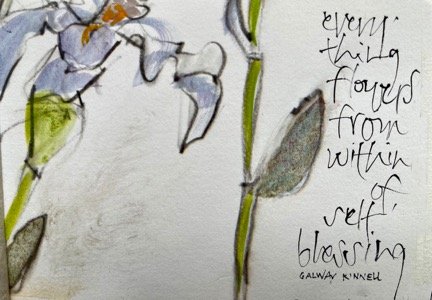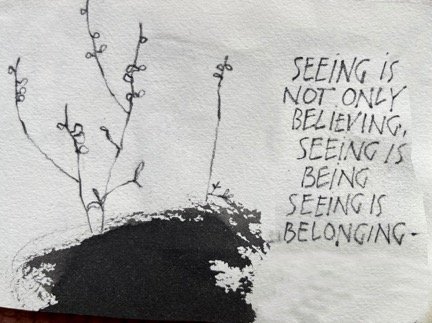“Perhaps / The truth depends on a walk around a lake”
— Wallace Stevens, Notes Toward a Supreme Fiction
With my eyes closed, a brush in each hand and sitting with my back to a beech tree, I am recording the sounds of the crow (bold) and songbirds (light). This exercise brings pure joy.
— Soundscape © Laurie Doctor Sketchbook
Wallace Stevens, the poet (who had a day job at an insurance company), considered a seventeen-and-a-half-mile walk “a good days jaunt.” He walked in town, in the woods, and along highways. It was the walking that mattered. His poems depended on the enlivening of his senses, and the movement and observations that walking cultivated. It was in the early 1900s, when people walked more. And when they walked they did not have phones or earphones, and so were more attentive to their surroundings, noticing smell and sound and sight, even touch and taste. The mind was open to make space for new arrivals in the form of insight, phrases or words.
Interior joy has power to make luck more favorable — Descartes
©Laurie Doctor sketchbook
Even earlier, in the 1800s, Henry David Thoreau lamented the loss of the art of walking, and how few people understood this “genius for sauntering.” He reminds us that the word saunter goes all the way back to the Middle Ages, when a saunterer was an idle person who wandered the countryside asking for alms. The saunterers claimed to be on a journey to “Sainte Terre,” to the Holy Land. When the children spied a saunterer they shouted there goes a Sainte-Terrer, a saunterer, a Holy-Lander!
I lament, too, how infrequent it is to find someone just walking, without bringing anything but perhaps a pen and paper along. Mary Oliver, whose poetry most of you know, walked everyday with her small pocket notebook and pen. When she died, she left dozens of these notebooks filled with random thoughts, observations and even partial grocery lists. It was her indirect way of finding a poem, her trust in something coming just by paying attention, by being willing to “waste” time. She said to herself: This notebook is not for poetry. Yet when she went over her notes later, often some fragment would incite a poem.
…everything flowers from within, of self-blessing
— Galway Kinnell ©Laurie Doctor Sketchbook
I, too, often think (and I too often think!) oh, I need to bring my phone for photos, or I could call my faraway friend, or be on-call myself. There is always a reason to bring my phone along, always something I want to listen to. Lately, thinking of the long partnership between writing and walking, I am feeling more inclined to be a saunterer, and to at least aim for the Holy Land by taking “noticing” walks, leaving the camera behind. Yesterday, because I had no way of taking photos, I stopped more often and for longer periods of time. I knelt down to take a closer look at the turkey tail mushrooms on the bark of a fallen tree. I sat down on the forest floor and pulled off a few mushrooms. They are shaped like shells and decorated in line patterns of browns and blacks on white, and stacked together along the bark in irregular rows. I put a few in my pocket, and discovered once back home that they have long been considered remedies for many things, including respiratory and immune system disorders.
…seeing is being, seeing is belonging
©Laurie Doctor sketchbook
It’s so quiet in the woods in winter, but today I heard, in the late afternoon sun, the great horned owl calling, even before it was beginning to get dark. That sound is an unusual one in daytime, and stayed with me long after I was home. Now I am aiming for longer walks, inspired by the impressive list of poets and philosophers that have come before us, finding their way by walking; and by Wallace Stevens saying:
and as I went tramping through the fields and woods I beheld every leaf and blade of grass revealing or rather betokening the Invisible.
— Wallace Stevens’s Journal, Sunday, August 10, 1902
Oh, betokening the Invisible. Isn’t that the heart of being a maker? What brings you into a “moseying” state of mind? I’d love to hear from you.




